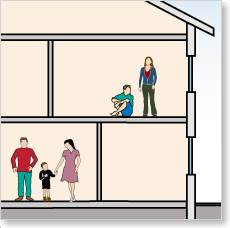The term residents resident is generally used to describe people who spend a very long time in the building, for example, an entire workday.
Some groups of this population may be particularly susceptible to indoor air pollution.
Some groups of this population may be particularly susceptible to indoor air pollution.

For example:
See more room tips
allergies or asthma, people with respiratory diseases, people whose immune system is weakened, contact lens wearers, and many other groups.
Since people react differently, are sensitive, it may be that an individual at a particular air quality problem responding while other residents show no symptoms.
It may also be that a single indoor air quality problem trigger different responses in different people, and others again not affected.
It may also be that a single indoor air quality problem trigger different responses in different people, and others again not affected.
 Typical symptoms and complaints
Typical symptoms and complaints
The effects that can cause poor indoor air quality, are rather non-specific symptoms as well-defined diseases.
Symptoms that are generally attributed to poor indoor air quality are:
 headache
headache
 fatigue,
fatigue,
 shortness of breath;
shortness of breath;
 Cough, increased Blowing Nose
Cough, increased Blowing Nose
 Irritation of eyes, nose, or throat;
Irritation of eyes, nose, or throat;
 Irritation,
Irritation,
 Nausea and many other symptoms.
Nausea and many other symptoms.
These general symptoms may also be caused by other factors and are not necessarily due to poor indoor air quality.
 One of the most mentioned complaints regarding the indoor air quality is it smells funny.
One of the most mentioned complaints regarding the indoor air quality is it smells funny.
Odors are often associated with the notion of poor air quality, regardless of whether they cause any symptoms or not.




